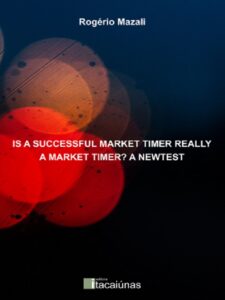 Livro: IS A SUCCESSFUL MARKET TIMER REALLY A MARKET TIMER? A NEWTEST
Livro: IS A SUCCESSFUL MARKET TIMER REALLY A MARKET TIMER? A NEWTEST
Autor: Rogério Mazali
Previous literature indicates that market timing strategies are of little e¢ cacy. The e¢ cacy of market timing strategies in mutual funds is usually measured by the coe¢ cients in linear regression models with dummy variables that allow for the beta coe¢ cient in the CAPM to vary across two states of nature: bullish and bearish market excess returns, or through a quadratic regression. Managers, however, use their predicted instead of observed states of nature to define whether to carry low or high beta portfolios. Hence, these previous studies may be considering funds that do not use market timing strategies as failed market timers and, thus, underestimate the power of these strategies. The current study models market timing as a change in regime in Hamilton’s Markov Switching Model. It also proposes tests for the existence and efficacy of market timing strategies using LR statistics based on the model’s estimates. The proposed models are then estimated and tested using Brazilian data and its results compared to those of typical market timing strategy models. We find significant differences between the results obtained using our approach and the traditional dummy variables approach.
